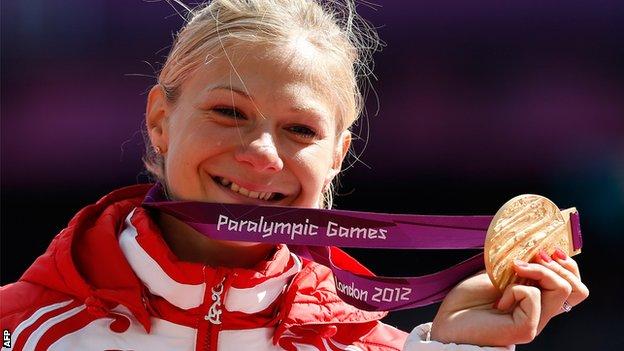Russia will not compete at next month’s Paralympics in Rio after losing an appeal against a ban imposed for state-sponsored doping.
The Court of Arbitration for Sport (Cas) upheld the International Paralympic Committee's (IPC) ban on all Russian competitors.
The IPC made the decision in light of the McLaren report, which detailed a state-sponsored doping programme operated by Russia.
The Paralympics begin on 7 September.
The IPC's decision to ban the entire Russian team "was proportionate in the circumstances", according to the Cas panel, which said it would publish the full grounds for its decision later.
It added that the Russian Paralympic Committee did not file any evidence contradicting the facts put forward by the IPC.
The IPC's decision is in contrast to the International Olympic Committee (IOC), which chose not to hand Russia a blanket ban from the Olympic Games.
The IOC was widely criticised for ignoring the World Anti-Doping Agency (Wada) recommendation to ban Russia.
Instead, each individual sporting federation was given the power to decide if Russian competitors were allowed to compete. A three-person IOC panel then had the final say.
In the end, more than 270 Russian athletes were cleared to compete at the Olympics, with Russia winning 56 medals in total and finishing in fourth place in the medal table.
Russia had been set to take 267 competitors across 18 sports to the Paralympics. The Cas statement added that it had not looked at the "natural justice rights or personality rights" of individual Russian athletes in making its decision.
Russia's Paralympic team's lawyer, Alexei Karpenko, confirmed the decision was final, saying they would try to file an appeal with the Swiss Federal Supreme Court, but it would take between one and two years for the court to consider the case.
"So I'm afraid Russian Paralympians will not be going to the Games in any case," Karpenko added.

Margarita Goncharova, a three-time Paralympic gold medallist in athletics, is among the Russians who will miss out on competing in Rio
IPC president Sir Philip Craven, who has described Russia's anti-doping system as "broken, corrupted and entirely compromised", and claimed it put "medals over morals", said he was "greatly encouraged" by the Cas decision.
He said it was "not a day for celebration", adding: "We have enormous sympathy for the Russian athletes who will now miss out."
"It is a sad day for the Paralympic movement," said Craven. "But we hope also a new beginning. We hope this decision acts as a catalyst for change in Russia and we can welcome the Russian Paralympic Committee back as a member safe in the knowledge that it is fulfilling its obligations to ensure fair competition for all."
Russian sports minister Vitaly Mutko said the ban was "political" and "not within legal framework", while lawyer Karpenko called it a "black day for the sports judiciary".
He said: "I can only express huge disappointment at the ruling. The rights of Russian Paralympians have been blatantly violated.
"Regardless of whether the Russian Paralympics Committee is guilty of the charges, punishing innocent athletes and not allowing them to defend themselves - which was an opportunity afforded to the Russian Olympics athletes - this is a flagrant violation of human rights."

Russia won 80 medals, inclduing 30 gold, at the Sochi 2014 Winter Paralympics - the most in a single Winter Paralympics
Richard McLaren, a Canadian law professor, published a Wada independent report that found Russia's sports ministry manipulated urine samples provided by its athletes between 2011 and 2015.
The report identified 27 samples relating to eight Para-sports, five of which are summer sports, including some governed by the IPC.
The IPC also found evidence that samples were swapped during the Sochi 2014 Paralympic Games, adding that it planned to reanalyse every Russian sample given at the event.
Paralympics going ahead despite major cuts
The Paralympics are going ahead as planned, but face major budget cuts as Rio's organising committee has not raised enough to fund the event because of Brazil's struggling economy and poor ticket sales.
Cuts will affect venues, workforce and transport. Delayed travel grants will now be paid to athletes, but 10 countries may struggle to get teams to Rio.
Latest Stories
-
Ghana’s record reserves will be prudently managed – BoG Governor assures
1 hour -
Okada on reset, make room to accommodate them, new rules in the offing
2 hours -
WGHS 2004 year group launches major fundraising drive for 2026 Speech Day and Legacy Project
2 hours -
Fidelity Bank launches Orange Inspire to empower creative economy
2 hours -
When 7 million Ghanaians chose silence: The true story behind 2024 voter apathy
2 hours -
Growing BRICS group shows internal rifts as ministers fall short of joint statement
3 hours -
‘You didn’t suffer any injury’ – State attorney tells assaulted journalist Latif Iddrisu
3 hours -
Two convicted for human trafficking
3 hours -
3 alleged Indian gold smugglers remanded in custody
4 hours -
Labourer remanded for theft of retired lecturer’s items
4 hours -
Philippines condemns killing of veteran journalist
4 hours -
Meghan uses ‘HRH’ title but denies breaking rules
4 hours -
We have to do something special in Paris – Arteta
5 hours -
Malta’s golden passport scheme breaks EU law, top court rules
5 hours -
Man accused of Kim Kardashian Paris robbery ‘regrets’ $10m heist
5 hours

